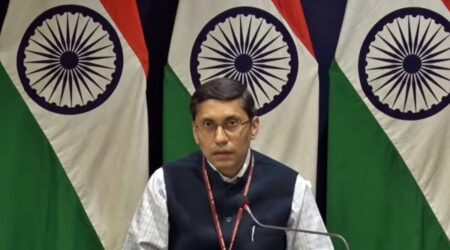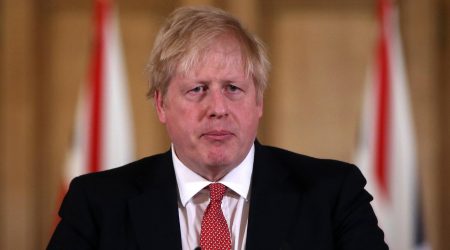By Maj. Gen. Sudhakar Jee
Ending weeks of speculation and political back room maneuvering, on November 24 Pakistani leadership decided to hand over the destiny of their country and themselves in the hands of General Asim Munir Ahmad.
Gen. Munir is a four-star rank General and replaced General Qamar Javed Bajwa, whose six-year tenure as Army Chief will come to an end on November 29. Gen. Munir was due to retire on November 27, but after the appointment as army chief, he will be in uniform for at least another three years.
Gen. Asim Munir: A Profile
He will be Pakistan’s 17th Army Chief since it was carved out in 1947. In his role as the QuarterMaster General (QMG) before taking over the reins of the Pakistan Army, he is overseeing supplies for all military units.
Gen. Munir had earlier served as the Corps Commander at Gujranwala from 2019-2021. Gen. Munir was unceremoniously replaced as the Director General of Pak’s all-pervasive intelligence agency – ISI, by Lt. Gen Faiz Hameed on June 16, 2019. He had also been the head of the Military Intelligence (MI) of Pakistan.
Munir had the shortest ever tenure for an ISI chief that lasted only eight months. Then Prime Minister Imran Khan removed him unceremoniously as he was believed to have brought the alleged corruption of Khan’s religiously inclined wife Bushra Begum to his notice. Her charm prevailed on the heartthrob former cricket and lightning fell on Gen. Munir, waiting at the doorsteps of the power corridors.
Challenging Times
Gen. Munir will be the chief of the Pakistani Army at the crucial juncture of its fragile democratic history when the opposition parties are fighting a war against the government on the roads while two major political parties that have been two opposite poles till now, have joined hands to form a government under Prime Minister Shehbaz Sharif. Imran Khan has publicly accused the outgoing Chief Gen. Bajwa of playing a role in his ouster, a charge denied by him.
Moreover, the Army in Pakistan also runs the economy of their various state monopolies and business entities. Pakistan’s economy is crippled, and there was unprecedented devastation due to historic floods along with other challenges including internal security from the homegrown terrorist groups.
The outgoing chief Gen. Bajwa, in his farewell speech, insisted that the Pakistan army is now apolitical while everyone across the venue and the globe smiled. Everyone knows that in Pakistan, the Army is the “establishment”.
Imran Khan has vehemently blamed the army, and the United States for having a role in his ouster in April, 2022. Imran Khan’s ambitious and passionate attempts of an electoral comeback with surging popularity further adds to the challenges the new chief will have to handle.

Asim Munir Anywhere: Gen. Asim Munir Ahmad
The fate of Bajwa Doctrine
The ‘Bajwa doctrine’ spelt by outgoing Army Chief Gen. Bajwa was a strategic reset towards a ‘normal’ Pakistan at peace with its neighbors with elements of ‘geo-economics’. The ‘historical’ dimension of the ‘apolitical’ army was added later to the Bajwa doctrine. But with allegations of his family’s multimillion dollar investment across the globe now belies everything he stood for as an Army man.
Moreover, Imran Khan will also have to live with the fact that Gen. Munir controls the reins of the Pak Army while he remains a political struggler and his chess moves to play army generals against each other at the crucial juncture failed to benefit him at all.
Challenges Abound
Though Pakistan army has been exposed, time and again, at the world level for patronizing and exporting terrorism globally, but it is currently facing acute pressure from the inside, first time in its checkered history. The army’s image has been severely dented by Imran Khan’s invectives in the recent past ever since his ouster in April 2022.
Gen. Munir will have to first fix the former prime minister while he manages the more docile incumbent one. Given the increasing skirmishes with the Afghan Taliban on Durand Line and regular attack by Baloch freedom fighters on Pakistani army convoys and more importantly on Chinese working in the country will keep the new army chief on toes.
Pak Army and its generals clearly know that there is nothing called ‘normal’ Pakistan and they have a task in hand to manage a rugged and largely uncivilized country of religious zealots.
Gen. Munir: A Hardliner
Gen. Munir is assessed to be a “hardliner” in the Pakistan Army and was allegedly involved in the conspiracy of Pulwama attack on February 14, 2019.
Unlike his three predecessors, Gen. Kayani, Gen. Sharif, and Gen. Bajwa, Munir does not possess training experience in the United States or United Kingdom. He has largely served on the home soil barring a short tenure in Saudi Arabia, which is likely to preclude him from a more holistic worldview.
Hanging with support of China on one hand and Saudi Arabia on the other, neither foreign policy nor domestic control of everything in Pakistan by the ‘establishment’ is likely to see any change under the new army chief.
Balancing Beijing and Washington
Gen. Bajwa was granted a visit to Washington at the fag end of his tenure while Imran Khan was racking moolah on the roads of Pakistan. Under Gen. Bajwa, Pakistan has embarrassed the ‘friendship without any limit’ with Beijing while his approach towards the U.S. was a calibrated one. Bajwa was helped by his experience and exposure with the way things work in the US while Gen. Munir might be starting from a point of disadvantage in this aspect.
With the U.S. more focused on Iran, North Korea and Chinese assertion in the South China Sea, Washington would like to maintain the tranquility at the Durand Line and the onus will be on the new army chief to keep their ‘talibs’ under control.
Slog Over by Imran Khan
Pakistan, currently, is in the midst of another bout of political turmoil as PTI chief Imran Khan is leading country-wide protests in an attempt to force Prime Minister Shehbaz Sharif into early elections. The ‘apolitical’ army of Gen. Munir has its task cut out to tame the rising political temperature in the country.
Moreover, he will be perceived as ex-PM Nawaz Sharif’s appointee.
With Pakistan out of FATF grey list on terror financing, and International Monetary Fund (IMF) handing out a bailout package in wake of the unprecedented floods, this hot spot of global terrorism is likely to remain under the scanner of the world. China is likely to tighten its grip on Pakistan to secure not only its economic interest but also the security of its workers manning the project.
This is exactly why China is insisting to offer its own security cover to the Chinese workers, a direct challenge to the efficacy of the Pakistani army in their own home turf.

Maj. Gen. Sudhakar Jee, VSM, is a former colonel of the Mahar Regiment who superannuated in 2020 after more than 37 years of active service. He has commanded troops in varied terrain, climate, and conflict zones. Currently, he is pursuing a doctoral thesis on the India-China border dispute.
Disclaimer: The views expressed are not necessarily those of The South Asian Times










